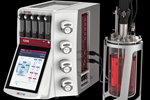Henkel Expands Additive Manufacturing Services
Henkel’s additive manufacturing services continues to support existing automotive and industrial customers from design to final part manufacturing.

Henkel engineer working with a customer to optimize 3D-printed part.
Henkel is expanding its additive manufacturing services, designed primarily for automotive and industrial customers, to provide support with 3D printable materials, from design to final part manufacturing.
Henkel additive manufacturing services will leverage the company’s sizable existing infrastructure and internal capabilities at strategically located application centers and at its certified plant in Richmond, Mo., which is already supplying millions of traditionally produced parts to a host of automotive and industrial customers.
These facilities meet and exceed exacting industrial standards including: OHSA 18001:2007, ISO/TS 16949:2006, EMS ISO 14001:2015 and ISO 9001:2015. This services offers a wide range of 3D printing capabilities including stereolithography, digital light processing, and multijet fusion, in addition to dedicated post-processing and finishing services.
“Within Henkel additive manufacturing services, we’re focused on providing additional support to our existing industrial customers, including OEM automotive manufacturers and their top suppliers,” said Simon Mawson, senior vice president and head of 3D printing. “They have very unique requirements, and we’re leveraging our vast material portfolio to help them build quality, repeatability and scalability into their additive manufacturing efforts. They want to produce end production parts, and our mission is to help them achieve that goal.”
The company says that its AM services works primarily with applications where parts are intended for ongoing, serial production. In addition to assisting with selecting and optimizing the right material for each part, the team can provide input early in the product development lifecycle, helping customers optimize their designs for function, surface finish, and to understand geometric dimensioning and tolerancing requirements. They also assist with part validation and other quality initiatives, including dimensional analysis of finished pieces.
“Knowledge of materials, and additive manufacturing workflows are critically important to the future success of 3D printing in a production environment,” said Chris Liddiard, market segment head automotive and industrial parts. “Equally important, and often overlooked is a knowledge of industrial customer requirement, APQP, exacting customer quality requirements, and seamless part ordering and delivery. Failure to control and manage all these factors can lead to a breakdown in customer supply chain. Henkel’s long history in producing and delivering traditionally manufactured parts as a Tier 1 to multiple industries, coupled with exciting material development in additive manufacturing is a powerful combination to lead the development of the production of reliable end use parts.”
Related Content
-
Make Every Shot Count: Mold Simulation Maximizes Functional Parts From Printed Tooling
If a printed tool only has a finite number of shots in it, why waste any of them on process development?
-
The Connector Conundrum: 3D Printed Mold Tooling’s Role in Innovation
ReelView Fishing faced an electronics obstacle in the development of its new technology for underwater video. Additive manufacturing for moldmaking allowed for the speed necessary to iterate to a solution. How inventors and invention will benefit from new ways of obtaining production-ready tooling.
-
Freeform Injection Molding Eases the Path to Medical Device Product Testing
A development and manufacturing service provider is using dissolvable molds to build injection molded silicone prototypes.















